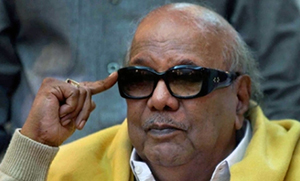Chennai, Sep 24: The ruling AIADMK today lashed out at DMK chief M Karunanidhi for seeking a special session of Tamil Nadu Assembly to discuss the Cauvery issue, saying he came up with such demands as he was "irked" over Chief Minister J Jayalalithaa's "repeated victories" in the inter-state row and wanted to "conceal his betrayals" in the matter.
By making such demands, Karunanidhi was trying to "conceal his betrayals" in the Cauvery issue, an article in the AIADMK mouthpiece, 'Namadhu MGR', alleged.
"While the repeated victories ensured by our mother (Jayalalithaa) in the Cauvery issue by approaching the Supreme Court have irritated Karnataka, they have irked Karunanidhi as well," it claimed.
The Jayalalithaa-led Tamil Nadu government had approached the Supreme Court in the Cauvery issue, seeking a direction to the Centre for notifying the 2007 tribunal award in the Central gazette.
It had also moved the apex court early this month, asking it to direct Karnataka to release water from the Cauvery river to Tamil Nadu.
On both the occasions, the court had ruled in Tamil Nadu's favour.
"That is why, he (Karunanidhi) makes meaningless demands like seeking a special Assembly session or all-party meetings to pretend as if he too is concerned about the Cauvery issue," the article alleged.
It went on to say that while the recently concluded Assembly session had gone on for over a month, the DMK chief had not attended the proceedings but had just turned up to "sign the register".
Karunanidhi is an MLA from Thiruvarur.
The article claimed that "intelligent manoeuvres" by Jayalalithaa was leading the state towards a "permanent victory" in the water-sharing row even as it added that the Siddaramaiah government in Karnataka was "stunned" following the apex court's directive, asking it to release Cauvery water to Tamil Nadu.
Karunanidhi was "unable" to stand the state benefiting in the Cauvery issue due to Jayalalithaa's decision to seek legal recourse, it alleged.
The DMK chief had urged the Tamil Nadu government to convene a special session of the Assembly like Karnataka.
In a special sitting of its legislature yesterday, Karnataka virtually refused to spare any more Cauvery water to Tamil Nadu as directed by the Supreme Court, adopting a resolution to use water only for drinking purpose.





Comments
Add new comment